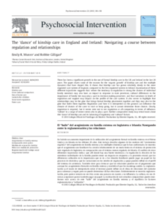This article is part of a special edition of the journal Psychosocial Intervention (Volume 22 No.03 December 2013) focused on the state of child protection in a wide variety of countries with special attention to out-of-home care placements, principally family foster care and residential care, tough several aspects related to adoption were included as well.
This fascinating paper provides a brief overview of the looked after system in the UK and the equivalent care system in Ireland before going on to explore similarities and differences in how different jurisdictions navigate a course between legislation, regulation and providing enduring relationships for children in family based placements. It focuses in particular on the use of kinship care and explores some of the implications of some differences in how the two state systems approach the regulation of kinship care and manage related support arrangements. Consistent with international trends, family placement (unrelated and kinship care) is now the dominant form of formal care across the UK and Ireland: ranging from 57 per cent of placements in Scotland to close to 90 per cent in the Irish care system. Ireland also shares with Australia the distinction of having the lowest rate of reliance on residential care internationally (10% or less), whereas England has a slightly higher reliance, currently standing at 12 per cent. This is particularly noteworthy considering the high rates of placement in institutions in Ireland until the early 1970s.
Data from the 2001 UK Census has shown that the vast majority of kinship care arrangements in the UK were informal (over 90%) with little if any involvement by children’s care authorities. Yet there has also been a significant growth in the use of formal kinship care in the UK and Ireland in the last 20 years. However, the proportion of children in formal kinship care in England remains low compared to other parts of the UK, standing at 11 per cent compared to 15, 25 and 27 percent in Wales, Scotland, and Northern Ireland respectively. Ireland makes the greatest use of formal kinship care (29%) and also has one of the highest rates of placements with families globally. The authors explore in this paper some of the reasons for this ‘organic growth’ and the multiple dynamics that have shaped this. It shows that kinship care has grown relatively slowly in the more regulated care system of England, compared to the less regulated system in Ireland. According to the authors, examination of these different trajectories suggests that: where the tendency to regulation is strong the choices of individual family members may also have an impact in response to state provision; cultural differences in the importance of family ties may play a part in decision-making processes; and that variations in levels of regulation and support may impact on the profile of the care system. It also serves to highlight that relationships may be the glue that brings formal kinship placements together and they may also be the glue that holds them together.
To access the abstract of this article, please click here.
©Psychosocial Intervention 22 (2013) 251-7 - Vol. 22 No.03

